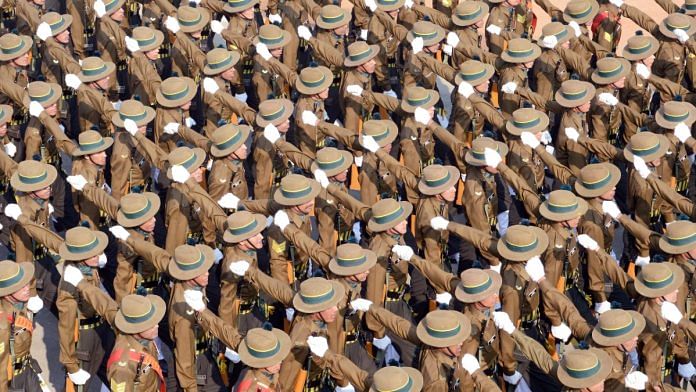New Delhi: For the third time since last June, the Indian Army will not be recruiting any Gorkha soldier from Nepal amid the ongoing deadlock between the two countries over the Agnipath scheme, ThePrint has learnt.
In August 2022, the Nepal government blocked recruitment of Nepalese Gorkhas for the Army’s 43-battalion-strong Gorkha Regiment under the Agnipath scheme, claiming that it violated the 1947 Tripartite Agreement signed between the two countries and the UK.
The scheme, which was unveiled last June, is a modified recruitment policy under which the armed forces are recruiting individuals below the rank of officer. Only 25 percent of the total recruits will be regularised upon the completion of four years of service.
All recruitment for the armed forces at the soldier level, which had come to a standstill during the Covid-19 pandemic, is now taking place through the Agnipath scheme.
Nepalese constitute about 60 percent of each battalion of the Gorkhas, while Indians make up the rest. And although about 12,000 Gorkha soldiers from Nepal have retired since 2021, no new Nepalese Gorkhas have been recruited since Nepal blocked the first round of recruitment last July, the second round in February this year and the latest round of recruitment, which is already underway in various parts of the country.
Nepal had initially objected to the Army’s new recruitment policy, saying that it went against the understanding reached between the two countries over the service conditions of soldiers.
Sources in the defence and security establishment told ThePrint that there are three main points to the 1947 agreement.
The first being, Nepali recruits cannot be treated as mercenaries. Secondly, their pay and emoluments should be the same as that of native soldiers, and lastly, their recruitment should not cause any threat to the security and sovereignty of Nepal.
While all these clauses have been adhered to by the three parties, the UK has “unofficially” reduced the number of Gorkhas in the British Army, said sources.
It was during 1814-16, that the British East India Company fought a war against the powerful city-state of Gorkha in what is now western Nepal. Although the British won, they were impressed by the fighting qualities of their Gurkha (now Gorkha) opponents. The UK’s National Army Museum notes that under the terms of the subsequent peace treaty, large numbers of Gurkhas were permitted to volunteer for service in the Company’s army.
Sources said that at the time of India’s Independence, the existing Gorkha battalions in the British Indian Army were divided between India, Nepal and the UK. The soldiers were then given the option to choose — 14 of the 21 battalions at the time chose to remain with India while the remaining seven opted for the UK.
Also Read: Army, Navy, IAF finally ‘99%’ in agreement over structure of proposed theatre commands
Nepal’s objections
Sources added that when the Agnipath scheme was first launched, Nepal’s Foreign Minister Narayan Khadka conveyed to India’s Ambassador to Nepal Naveen Srivastava that recruitment under it was a deviation from the original Tripartite Agreement.
The government in Kathmandu also conveyed its disappointment with New Delhi for not having consulted it over the introduction of the Agnipath scheme and expressed its desire for political consultations to be held with all parties in Nepal in this regard.
It was explained to the Nepalese that the service conditions remain the same for soldiers of Nepalese origin and Indian origin since the new rule applies to both.
Nepal, however, is concerned that the 75 percent of soldiers who will be let off after four years of service could pose a security threat since they, having undergone military training, will be without jobs or a pension, sources added.
Colonel Razzaque Adil (Retd) — who commanded a 3rd Gorkha Rifles Battalion for four years in Kargil and Rajasthan — told ThePrint that issues between the Indian and Nepalese governments could turn into a problem for the Gorkha regiment, which might face a manpower crunch in the future. “Currently, there is a backlog, which has kept it stable and going. This may, however, not be true in the future.”
He added, “As I see it, the government in Nepal is concerned about most soldiers leaving the Indian Army and entering unemployment with only 25 percent being absorbed. While this is a concern even in India, I feel it is at least better than nothing.”
Colonel Adil also said that the Government of India should try to be more flexible with Nepal and grant them at least some concession “while showing the magnanimity of a big brother”. He suggested that just as some Agnipath recruits would be absorbed into the Central Armed Police Forces (CAPF), soldiers of Nepalese origin should also be considered for such opportunities since these forces already have personnel of Nepalese origin.
Nepal has remained steadfast in its decision, despite high-level visits including that of Chief of the Army Staff (COAS) General Manoj Pandey to the Himalyan country last September, and Nepalese Prime Minister Pushpakamal Dahal’s four-day visit to New Delhi this year which concluded on 3 June.
This is an updated version of the article.
(Edited by Amrtansh Arora)
Also Read: Armed forces to have common annual confidential reports for senior officers from this year



